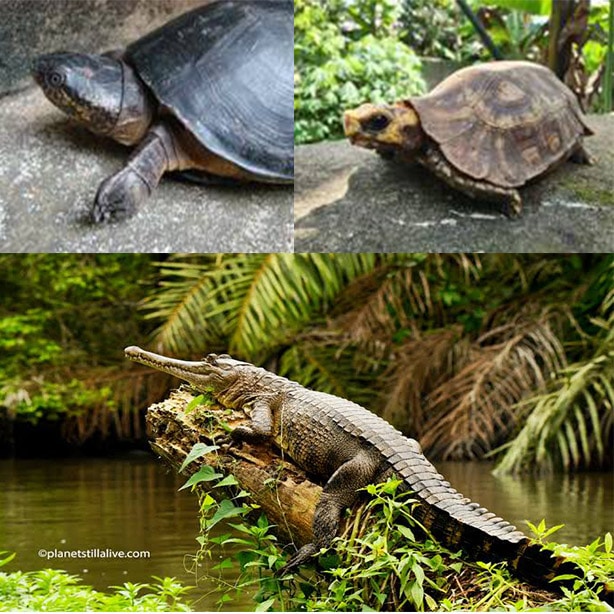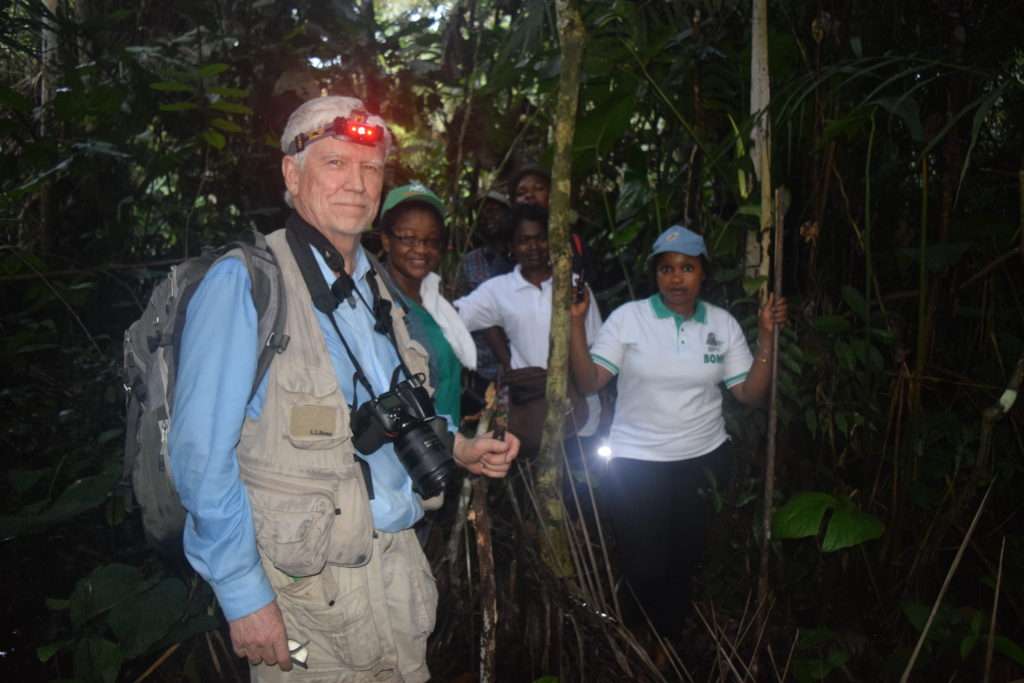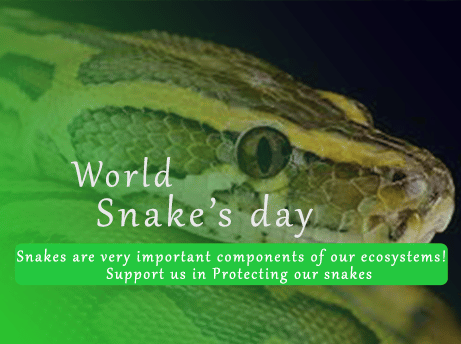AN ADDRESS BY THE BPC DIRECTOR OF PROJECTSDURING THE LAUNCHING OF OUR COMMUNITY-BASED PROJECT TITLED: BUILDING A COMMUNITY-BASED CONSERVATION INITIATIVE FOR THREATENED TORTOISES AND CROCODILE IN UYO, AKWA IBOM STATE BY BIODIVERSITY PRESERVATION CENTER, UYO HELD AT ESUK MBAT COMMUNITY, AKPABUYO L.G.A., CROSS RIVER STATE ON SATURDAY 5TH DECEMBER, 2020
THE PROJECT OVERVIEW:
This project which is sponsored by SGP Nigeria focuses on the conservation of two species of forest hinge-back tortoises (genus Kinixys: Testudinidae, K.homeanaandK.erosa) and a species of crocodile, the African slender-snouted crocodile (Mecistopscataphractus). All three species are endemic to tropical Africa and are considered highly threatened in the IUCN Red List (two Critically Endangered and one Endangered). These species are typically associated with tropical forests, and K. homeana is endemic to the Guinean coastal forests. Over 50 of these tortoises have been recently rescued and kept in our conservation education center/mini park in Uyo.
The conservation situation of these species is understood to have considerably deteriorated in the last two decades, due to widespread forest habitat loss and intensive harvesting for domestic consumption in West Africa. K. homeana was assessed as CRITICALLY ENDANGERED, K. erosa as ENDANGERED and M. cataphractus as CRITICALLY ENDANGERED.
K. homeanaand M. cataphractus are under immediate risk of extinction because their populations are very much reduced even within protected areas. In addition, it was agreed that since there are no data on population sizes of these species inside corridors connecting distinct forest fragments, it should be a conservation priority to assess population size and demography of these species in such corridors as well as in remnant forest areas (see photos below).
K. homeanaand M. cataphractus are under immediate risk of extinction because their populations are very much reduced even within protected areas. In addition, it was agreed that since there are no data on population sizes of these species inside corridors connecting distinct forest fragments, it should be a conservation priority to assess population size and demography of these species in such corridors as well as in remnant forest areas (see photos below).



This project aims at:
1. Determining local distribution and population density in relation to habitat type in EsukMbat Community, Cross River state which remains the last place M. cataphactus was recorded in Nigeria over a decade ago until recent unconfirmed reports in 2018/2019.
PROJECT JUSTIFICATION AND BASELINE INFORMATION
For the three target species (Kinixyshomeana, K. erosa, andMecistopscataphractus), the remnant forests of southern Nigeria represent crucial conservation areas. Nigeria is the country with the highest number of historical records for K. homeana and
is the second most important in terms of records (after Democratic Republic of Congo) for K. erosa. In contrast, the target crocodile is nearly extinct in the whole of the country. In addition, the Nigerian populations of these species are likely to be very important in terms of their genetic structure, as these populations may represent the bridge between the easternmost populations (Congolian and Cameroonian populations) and the western populations occurring from the Togo hills bordering Ghana up to Liberia.
During the last two decades the conservation situation of these species in West Africa has deteriorated due to widespread forest habitat loss and intensive harvesting for domestic consumption. Agricultural and industrial expansion and deforestation pose severe threats to these species because of their high habitat specialization. These threats are particularly strong in southern Nigeria, where heavy deforestation occurs due to oil and natural gas industry development; this region being the most important oil-producing zone in all of Africa. Consequently, these species are rare and confined to small portions of territory, even inside protected areas in the Niger Delta region of southern Nigeria. Hunting of tortoises and crocodiles also continues to be a significant threat to many populations. In order to develop plans for the long-term conservation of our three target reptiles, it is essential that their population status and local habitat preferences are assessed at a local and regional scale. It is also fundamental to work with local communities on how best to manage these species as important natural resources, including their potential for ecotourism. The present project aims to collect field data on these three species, but also to develop local capacity to improve the management of these species and of their habitats.
ORGANIZATIONAL BACKGROUND OF BIODIVERSITY PRESERVATION CENTER (BPC), UYO
BPC is dedicated to the protection and preservation of Nigerian Biodiversity through field biological research, conservation education, outreach programs, anti-bushmeat campaigns and provision of alternatives to bushmeat through the “Only livestock” program and adopting sustainable NTFPs extraction and utilization. Collaborate with other local, national and international NGOs of like objectives to pursue a brighter and sustainable future for Nigerian biodiversity. Thus, our goal is to promote a safe and Healthy world through sustainable in situ and ex-situ biodiversity conservation.
The Center, which started out as Primates Preservation Group (PPG), was initiated by conservation minded individuals in 1996 to advance scientific knowledge and conservation of its Biodiversity through field and practical based resource governance initiatives with local community participation. Since field activities have increased at various locations across Rivers State, Akwa Ibom State, Cross River State (an area reputed to be the last portion of the tropical moist forest remaining in Nigeria). The organization has enjoyed collaborative support from local institutions namely: Cross River National Park, (CRNP), The University of Uyo, Uyo, and University of Calabar, Calabar and the Nigerian Primate NGOs (egPandrillusandCercopan). The group then metamorphosed to become Biodiversity Preservation Center (BPC) following increasing concerns to include other species aside from primates and the Nigeria environment in general. Eventually the Group had to be reorganized and restructured for incorporation in Nigeria by the Corporate Affairs Commission (CAC) of the Federal Government of Nigeria. At that point, the Groups’ name was adjusted by (CAC) to Biodiversity Preservation Center (BPC).
BPC has been concerned with field biological research on the Cross-River gorillas (Gorilla gorilladiehli) and the Preuss’s red colobus monkey (Procolobus badius preussi) in the Obudu plateau and Mbe Mountains as well as the Ikpan Forest Block in the Oban group of Forests, all in the tropical moist forests of south Eastern Nigeria. BPC have undertaken outreach programmes to fight against the ever-increasing bushmeat trade. BPC has collaborated or associated with tertiary institutions and research organizations as well as other NGOs concerned with primate’s conservation. The organization has produced radio and television, talk shows, documentaries, newsletters and participated in local and international conferences, seminars, workshops as well as consultancy on baseline studies and environmental impact assessment projects (EIA). Recently, BPC members have participated in herpetological, ornithological and mammalogical surveys especially in its project areas and Cross River National Park (CRNP).
BPC has been concerned with field biological research on the Cross-River gorillas (Gorilla gorilladiehli) and the Preuss’s red colobus monkey (Procolobus badius preussi) in the Obudu plateau and Mbe Mountains as well as the Ikpan Forest Block in the Oban group of Forests, all in the tropical moist forests of south Eastern Nigeria. BPC have undertaken outreach programmes to fight against the ever-increasing bushmeat trade. BPC has collaborated or associated with tertiary institutions and research organizations as well as other NGOs concerned with primate’s conservation. The organization has produced radio and television, talk shows, documentaries, newsletters and participated in local and international conferences, seminars, workshops as well as consultancy on baseline studies and environmental impact assessment projects (EIA). Recently, BPC members have participated in herpetological, ornithological and mammalogical surveys especially in its project areas and Cross River National Park (CRNP).
Any useful information on these three species of interest should be forwarded to:
Biodiversity Preservation Center (BPC)Grace of God Villa, AfahaIdoro,Idoro Road, P. O. Box 1867, UyoAkwa Ibom State. Website:www.biodiversitypreservationcenter.org Email- info@biodiversitycenter.org . Tel: +234 (0) 8145536045



